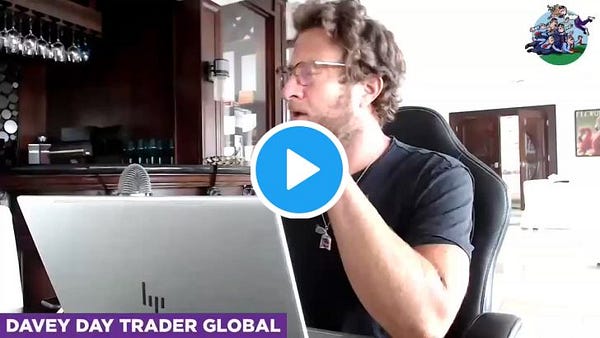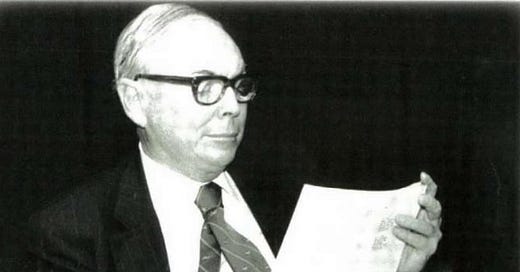5 Timeless Investing Lessons From Charlie Munger
If you care about long-term returns then Charlie Munger deserves your attention.
Charlie Munger’s investment track-record speaks for itself. This post transforms some of Charlie Munger’s timeless investing wisdom into a usable guide; one that will hopefully help you improve your odds of emulating Charlie’s long-term returns.
🧠 Stay humble (i.e. avoid over-confidence)
If you find yourself believing that you are the new Warren Buffett, you’re probably on the verge of losing a lot of money.


"Bull markets go to people's heads. If you're a duck on a pond, and it's rising due to a downpour, you start going up in the world. But you think it's you, not the pond."
“Part of the reason that [Warren Buffet and I] have decent records is that we pick things that are easy. Other people believe they're so smart they can take on things that are difficult. That proves to be more dangerous.”
How to do this? Charlie says it’s a good habit to trumpet your failures. One of my recent captions on @CharlieMungerQuotes includes relevant insight about overconfidence:
1. Overconfidence is a cognitive bias that causes us to make mis-calibrations of subjective probabilities. For example, despite the evidence that the vast majority of professional investors (i.e. active fund managers) cannot out-perform the S&P 500 Index over the long-term, there are countless investors who believe they have a higher-than-average chance of doing this. They insist on learning this the hard way.
2. The academic research on overconfidence bias, as it relates to investing, produced some interesting findings. The most cited study I read (3756 citations) notes that "overconfidence can explain high trading levels and the resulting poor performance of individual investors. Our central message is that trading is hazardous to your wealth." In another study (792 citations), the authors found that "investors who think that they are above average in terms of investment skills or past performance (but who did not have above average performance in the past) trade more."
See the full post on Instagram.
📖 Read the annual reports
I emphasized this via How To Research Stocks Like Warren Buffett. That post teaches you how to do it.
"…it takes a long time to read the annual report even if it’s a comparatively simple business because if you really are trying to understand it, it's not a bit easy."
“When I read annual reports, and I read a lot of them, I’m very frequently irritated by the presence of things that are totally absent from the Berkshire Hathaway annual report.”
Remember: Never buy a stock without reading the 10-K.
🔑 Combine extreme patience with extreme decisiveness
A few decisions make the big difference:
“The world is full of foolish gamblers. They will not do as well as the patient investors.”
“You do better to make a few large bets and sit back and wait. There are huge mathematical advantages to doing nothing.”
“Really good investment opportunities aren't going to come along too often and won't last too long, so you've got to be ready to act…”
This final quote comes via Damn Right! Behind The Scenes With Berkshire Hathaway Billionaire Charlie Munger:
What Charlie finds interesting when thinking back about all that progress is how few big business decisions were involved in creating billions of dollars out of less than $40 million, fewer than one every three years.
“I think the record shows the advantage of a peculiar mind-set—not seeking actions for its own sake, but instead combining extreme patience with extreme decisiveness.”
📚 Be a learning machine


“Well, I say what’s interesting about Berkshire, and many of you have been around for so long you’ve actually seen it happen, Berkshire’s record would have been terrible compared to the way it turned out if Warren hadn’t kept learning and learning and learning all the way.”
“The game of life is a game of everlasting learning. At least it is if you want to win.”
“We don’t have a one-size-fits-all system for buying businesses. They’re all different, every industry is different, and we also keep learning. So what we did ten years ago, we hopefully are doing better now. But we can’t give you a formula that will help you.”
“I think that a life properly lived is just learn, learn, learn all the time. And I think Berkshire’s gained enormously from these investment decisions by learning through a long, long period.”
⛄️ Use compound interest to your advantage
“Understanding both the power of compound return and the difficulty of getting it is the heart and soul of understanding a lot of things.”
“Well, when I was young, I read that savings bank thing, “The Richest Man in Babylon,” which taught the joys of underspending your income and investing the difference and how wonderfully it would work over time. And, lo and behold, I did exactly what this little pamphlet suggested, and it worked. And the other idea — and then so I got the idea that — I had a mental compound interest thing, too. And so I finally decided I was going to give the best hour of the day to improving my own mind, and then the world could buy the rest of the time. And that may have been a very selfish thing to do, but it worked.”
Warren Buffett agrees:
“Charlie’s always said that the big thing about it is we started building this little snowball on top of a very long hill. So we started at a very early age in rolling the snowball down. And, of course, the snowball — the nature of compound interest is it behaves like a snowball of sticky snow. And the trick is to have a very long hill, which means either starting very young or living very — to be very old.”
Recommended Content
Charlie Munger said the following about this book:
I was flabbergasted to find it not only very well-written but a considerable contribution to the synthesis of human thought on the investment process, and I would recommend that all of you buy a copy of Hagstrom’s second Buffett book. …It doesn't pick any stocks for you, but it does illuminate how the investment process really works if you think about it rationally. —Charlie Munger




